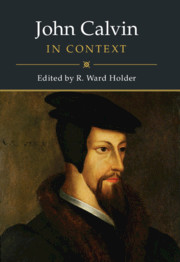Book contents
- John Calvin in Context
- John Calvin in Context
- Copyright page
- Dedication
- Contents
- Contributors
- Acknowledgments
- Abbreviations
- Introduction
- Part I France and Its Influence
- Part II Switzerland, Southern Germany, and Geneva
- Part III Empire and Society
- Part IV The Religious Question
- 19 Western Ideals of Religious Reform
- 20 The Luther Affair
- 21 Religious Colloquies
- 22 The Council of Trent and the Augsburg Interim
- 23 Biblical Scholarship
- 24 The Printed Word
- 25 Polemic’s Purpose
- 26 The Style of Theology
- 27 Baptism
- 28 The Eucharist
- 29 Predestination in Early Modern Thought
- 30 The Challenge of Heresy
- 31 Early Modern Christianity and Idolatry
- 32 Trinitarian Controversies
- 33 Nicodemism and Libertinism
- Part V Calvin’s Influences
- Part VI Calvin’s Reception
- Conclusion
- Bibliography
- Index
- References
28 - The Eucharist
from Part IV - The Religious Question
Published online by Cambridge University Press: 14 November 2019
- John Calvin in Context
- John Calvin in Context
- Copyright page
- Dedication
- Contents
- Contributors
- Acknowledgments
- Abbreviations
- Introduction
- Part I France and Its Influence
- Part II Switzerland, Southern Germany, and Geneva
- Part III Empire and Society
- Part IV The Religious Question
- 19 Western Ideals of Religious Reform
- 20 The Luther Affair
- 21 Religious Colloquies
- 22 The Council of Trent and the Augsburg Interim
- 23 Biblical Scholarship
- 24 The Printed Word
- 25 Polemic’s Purpose
- 26 The Style of Theology
- 27 Baptism
- 28 The Eucharist
- 29 Predestination in Early Modern Thought
- 30 The Challenge of Heresy
- 31 Early Modern Christianity and Idolatry
- 32 Trinitarian Controversies
- 33 Nicodemism and Libertinism
- Part V Calvin’s Influences
- Part VI Calvin’s Reception
- Conclusion
- Bibliography
- Index
- References
Summary
There was no more divisive theological issue in the sixteenth century than the Eucharist, the ritual understood by Christians as establishing their unity with Christ and with each other. The rite separated Catholics from Protestants, Lutherans from Reformed, and state-supported reformers from a variety of dissenting groups. Modern preoccupation with the question of Christ’s “real presence,” a term that only became common in the nineteenth century, has led to both a misconception of the sixteenth-century debate and an artificial narrowing of its scope. Disagreements were much broader than Christ’s presence and included not only the definition, purpose, and content of the sacrament but also when, where, how, how often, and with whom it should be celebrated. John Calvin’s discussions of the Eucharist reflected these many disagreements, and they must be read with an understanding of the audience he addressed and the particular issues that audience considered central.
- Type
- Chapter
- Information
- John Calvin in Context , pp. 240 - 248Publisher: Cambridge University PressPrint publication year: 2019

